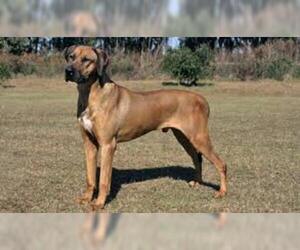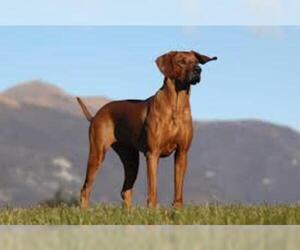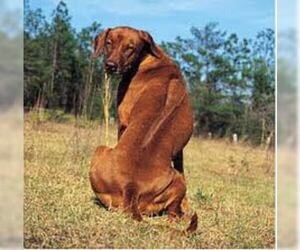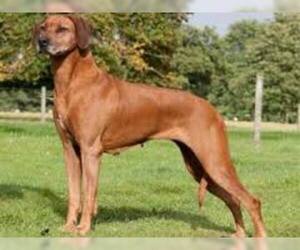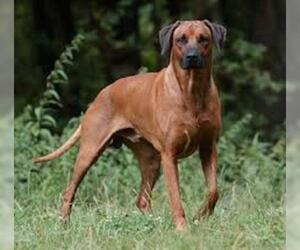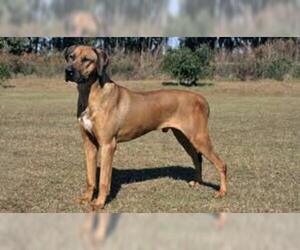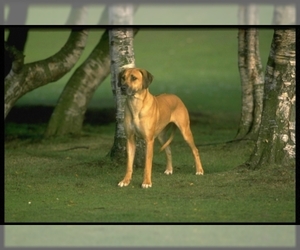
All about Rhodesian Ridgeback dog breed
A.K.A. :African Lion Hound, African Lion Dog, Ridgeback, Simmonds’ Dog, Coffin’s Dog, Lion Hunter, Leo Hunter, Ridgie, Ridgies
Size
Grooming requirements
Exercise requirements
Good with other dogs
Watchdog ability
Energetic
Training requirements
Playful
Affectionate
Good with other pets
Good with children
Good with strangers
Winter
Summer
Healthiness
Protective
Life Span
| Pure Breeds | Member |
| Breeds A - Z | R |
| Breeds by Group | Hound Hunting |
| Breeds by Trait | Good With Kids High Stamina Dog Breeds Smartest Dog Breeds |
| Overview: | The Rhodesian Ridgeback is a distinctive and noble breed, originally from Southern Africa, where they were developed to track and corner large game, including lions. Their most striking feature is the "ridge" of hair running down their spine in the opposite direction to the rest of their coat. Physically, they are strong, muscular dogs with a short, dense coat typically in shades of light wheaten to red wheaten. Temperamentally, Ridgebacks are known for being dignified, intelligent, and fiercely loyal to their families. While generally good with children they are raised with, their size and strength mean supervision is always recommended. They are not typically suited for apartment living due to their need for regular exercise and a secure yard. Health-wise, the breed is generally robust, but potential concerns include hip and elbow dysplasia, as well as dermoid sinus, a congenital skin condition. With proper training and socialization, the Rhodesian Ridgeback makes a wonderful, protective companion for active families. |
F.A.Q.
All You Need to Know About the Rhodesian Ridgeback Breed
The Rhodesian Ridgeback is a truly unique breed, originating from Southern Africa where they were bred to track and bay big game. Known for their distinctive "ridge" of hair along their spine, these are powerful, muscular dogs with a short, dense coat, typically a light to red wheaten color. Temperamentally, they are intelligent, independent, and dignified, often forming a strong bond with their families. While generally good with children in a well-socialized home, their strength and size mean supervision is key. They are not ideal for apartment living due to their high exercise needs; a large yard and regular vigorous activity, like running or hiking, are essential to prevent boredom and destructive behaviors. Grooming is minimal thanks to their short coat. Health-wise, potential owners should be aware of conditions like hip/elbow dysplasia and dermoid sinus. A well-trained and exercised Rhodesian Ridgeback makes a loyal, protective, and loving companion.The average weight of a Rhodesian Ridgeback typically ranges from 70 to 85 pounds. Adult males generally weigh between 80-90 pounds, while females are usually 70-80 pounds. This makes them a medium-to-large breed. Maintaining a healthy weight for a Rhodesian Ridgeback is crucial for their well-being, so discuss any concerns about their Rhodesian Ridgeback size with your veterinarian.
Wondering about the Rhodesian Ridgeback height? These majestic dogs have a distinct and impressive stature! The average height of a Rhodesian Ridgeback is between 24 to 27 inches measured at the shoulder (the highest point of their back, where the neck meets the body).
Here’s a breakdown of the typical adult height range:- Males: Generally stand between 25 to 27 inches tall.
- Females: Are usually slightly smaller, ranging from 24 to 26 inches tall.
Rhodesian Ridgeback Colors: What to ExpectWhen searching for a Rhodesian Ridgeback, understanding the various coat colors is key. The AKC recognized Rhodesian Ridgeback colors are limited and specific, reflecting the breed standard.The primary and officially recognized Rhodesian Ridgeback colors include various shades of light wheaten to red wheaten. This covers a spectrum from a pale, almost sandy color (light wheaten) to a rich, deep reddish-gold (red wheaten). Within these wheaten categories, you might see subtle variations described as fawn or golden. A small amount of white on the chest and toes is permissible by the AKC, but excessive white is considered a fault.Beyond the officially recognized standards, there are rare coat types and exotic Rhodesian Ridgeback variations that occur due to recessive genes, though these are not accepted by major kennel clubs like the AKC and are considered disqualifying faults in the show ring. These include brindle, which displays stripes of darker pigment over a lighter base. Other extremely rare Rhodesian Ridgeback colors include black, blue (a dilute black), liver/chocolate (a dilute brown), and even merle (a pattern of patches of diluted color). While these exotic Rhodesian Ridgeback variations exist, they are not typical of the breed and often come with associated health concerns or are the result of outcrossing. Potential buyers should be aware that these rare Rhodesian Ridgeback colors may command different pricing due to their novelty but do not conform to breed standards.
The Rhodesian Ridgeback personality is renowned for its dignified and independent temperament. They are exceptionally loyal to their families, often forming deep bonds, but can be reserved with strangers. While not overly friendly with everyone they meet, their sociability extends to a calm and tolerant nature, especially if well-socialized from a young age. Regarding adaptability to apartment living, Ridgebacks are not ideal for small spaces due to their size and need for regular exercise. They thrive with a yard and an active lifestyle. They are generally good with children they've grown up with, displaying patience and a protective instinct, though supervision is always recommended with any large breed. When it comes to behavior with other pets, proper introduction and early socialization are crucial. They can coexist peacefully with other animals, but their strong prey drive can be a factor, particularly with smaller, unfamiliar pets. The temperament of Rhodesian Ridgeback dogs is characterized by intelligence and a strong will, making consistent training essential for a well-behaved companion.
The Rhodesian Ridgeback temperament is renowned for its dignified, even-tempered, and devoted nature. These dogs are generally not overly friendly with strangers, often displaying a reserved demeanor, but are incredibly loyal and affectionate with their families, making them excellent companion dogs. They are highly intelligent but can exhibit a strong independent streak, which some owners may perceive as stubbornness. They are also surprisingly sensitive despite their powerful build, responding best to positive reinforcement training.Sociability: Rhodesian Ridgebacks are generally good with respectful children within their own family, often forming strong bonds. However, due to their size and power, supervision is always recommended, especially with very young children. Their behavior with other pets can vary; early socialization is crucial for them to accept other dogs and cats, though their strong prey drive means they might not be suitable for homes with small, fast-moving animals without careful introduction and management.Adaptability to apartment living: While they are not hyperactive indoors, Rhodesian Ridgebacks are large, athletic dogs requiring significant daily exercise. They are not ideal for apartment living unless their owners are committed to providing extensive outdoor activity, including running, hiking, or dog sports, to fulfill their physical and mental needs. Without adequate exercise, they can become bored and destructive. They thrive in homes with secure yards where they can stretch their legs.
Rhodesian Ridgeback Care GuideRhodesian Ridgeback care is generally straightforward, making them excellent companions for active individuals. Daily maintenance is minimal.Grooming Needs: Rhodesian Ridgebacks have short, dense coats that require minimal grooming. Weekly brushing with a rubber curry mitt or deshedding tool helps remove loose hair and keep their coat healthy. They are average shedding dogs. Bathing is only necessary when they are visibly dirty or to manage shedding.Exercise Limitations: Despite their powerful build, Rhodesian Ridgebacks are often described as a low-energy dog breed indoors. They require moderate daily exercise, typically 30-60 minutes, which can include walks, jogs, or playtime in a securely fenced yard. Avoid high-impact activities on hard surfaces, especially in younger dogs, to protect their joints.Dietary Considerations: Feed a high-quality commercial dog food appropriate for their life stage (puppy, adult, senior) and activity level. Monitor portion sizes carefully to prevent obesity, a common health concern. Consult your veterinarian for specific dietary recommendations. Fresh water should always be available.Wrinkle and Ear Cleaning: Rhodesian Ridgebacks typically have minimal to no wrinkles. If your dog has any skin folds, keep them clean and dry to prevent irritation and infection. Their ears should be checked weekly for redness, odor, or discharge, and cleaned as needed with a vet-approved solution.Climate Sensitivity (Brachycephalic Anatomy): Rhodesian Ridgebacks are not a brachycephalic breed and do not have the associated breathing difficulties or extreme climate sensitivities. However, like all dogs, they should not be left unattended in extreme heat or cold. Provide shade and water in warm weather and shelter in cold conditions.Common Health Concerns: Key health tips for Rhodesian Ridgeback owners include vigilance for potential issues. They are generally healthy but can be prone to certain conditions. Skin issues can sometimes occur, often related to allergies or environmental factors. Regular dental care, including brushing, is crucial to prevent plaque buildup and gum disease. Weight management is paramount to prevent joint issues and other health complications. Other concerns include hip and elbow dysplasia, dermoid sinus (a congenital skin condition unique to the breed), and thyroid issues. Regular veterinary check-ups are essential for early detection and treatment.
The Rhodesian Ridgeback activity level is moderate to high, characterized by a unique blend of energetic bursts and extended periods of rest. While they are powerful and athletic, they aren't hyperactive. Typically, Rhodesian Ridgeback exercise needs include at least 60-90 minutes of vigorous activity daily. This could involve long walks, jogging, hiking, or off-leash play in a secure area. They enjoy activities like fetch, exploring new trails, and participating in dog sports such as lure coursing or agility, which cater to their natural athleticism and prey drive.
Despite their energy, how active are Rhodesian Ridgebacks also depends on their age and individual temperament. Puppies and young adults will naturally have higher energy levels. Adult Ridgebacks are known for their "off switch," happily lounging and being calm indoors after sufficient exercise. They are suitable for active families who can commit to their daily exercise requirements. However, they are generally not suitable for low-energy households that cannot provide consistent physical and mental stimulation, as boredom can lead to destructive behaviors.It's important to note that while they are athletic, their brachycephalic (short-nosed) anatomy, though less pronounced than some other breeds, does impose some limitations. They can be prone to overheating, especially in hot and humid weather or during intense exercise. Therefore, exercise should be carefully monitored, particularly during warmer months, and always with access to fresh water and shade. Their playtime preferences often involve activities that allow them to use their strength and intelligence, and they thrive on having a purpose, whether it's a long walk or a challenging training session.Rhodesian Ridgebacks are not brachycephalic, so brachycephalic dog care practices are generally unnecessary. However, their deep chest and high activity levels contribute to heat sensitivity, especially during warm weather or intense exercise. Providing shade, hydration, and rest breaks is essential. Spinal problems such as arthritis or degenerative disc disease may occur with age or poor conditioning, particularly in dogs with limited mobility or excess weight.
Breed Breakdown: What Experts Say About the Rhodesian Ridgeback
I would rate the "Size" trait of the Rhodesian Ridgeback as an 8.This rating reflects their substantial build. Males typically stand 25-27 inches tall and weigh around 85 pounds, while females are slightly smaller at 24-26 inches and 70 pounds. They possess a muscular and well-boned body structure, giving them a powerful and imposing presence. When compared to the vast spectrum of companion dogs, from tiny Chihuahuas to giant Great Danes, Ridgebacks fall squarely into the larger end of the spectrum, being significantly bigger than many popular breeds like Beagles, Cocker Spaniels, or even Golden Retrievers in terms of overall mass and height. Due to their considerable size and the need for ample exercise, Rhodesian Ridgebacks are generally not best suited for apartment living or households with significant space constraints. While they can adapt to smaller homes if their exercise needs are met, a house with a yard is highly preferable. Their size can also make travel more challenging, requiring larger vehicles and potentially limiting options for pet-friendly accommodations.
I'd rate the Rhodesian Ridgeback's "Grooming Requirements" at a 2.This breed is remarkably low-maintenance when it comes to grooming. Their short, dense coat sheds moderately, but it's easily managed with a weekly brush to remove loose hairs and maintain shine, especially during seasonal shedding periods. They generally don't require professional grooming, trimming, or specialized coat care. Skin folds are minimal to non-existent, reducing the need for specific cleaning to prevent irritation. Ear cleaning is typical for most dogs, needing occasional checks and wipes, but they aren't prone to excessive earwax or infections. Nail trimming is a standard requirement for all dogs, and the Ridgeback is no exception, needing regular trims to prevent overgrowth. Bathing is only necessary when they are visibly dirty or smelly, as their coat is naturally resistant to dirt and dries quickly. While individual dogs can develop allergies or skin issues, the breed as a whole isn't particularly prone to them, making their skin generally easy to care for. Overall, the Rhodesian Ridgeback is an exceptionally easy-to-care-for breed in terms of grooming compared to many other companion dogs.
I would rate the exercise requirements of the Rhodesian Ridgeback at an 8.Rhodesian Ridgebacks are a high-energy breed originally developed for hunting lions, and their exercise needs reflect this heritage. They are not a breed that thrives with minimal activity; in fact, a lack of sufficient exercise can lead to destructive behaviors, anxiety, and weight gain. They require structured routines to stay healthy and mentally stimulated. Daily activity recommendations typically include at least one long, brisk walk or jog (45-60 minutes), preferably more, in addition to playtime and mental stimulation. Their energy levels are consistently high, and they have excellent tolerance for sustained movement, making them ideal partners for activities like hiking, running, and even long-distance walking.While not brachycephalic, meaning they don't have the respiratory limitations of breeds like pugs or bulldogs, their muscular build and stamina demand regular, vigorous exercise. They excel in activities that engage both their physical prowess and their intelligent minds, such as agility, lure coursing, or even advanced obedience training that incorporates movement. They are not content with just a leisurely stroll around the block; they need to truly "stretch their legs" and burn off their considerable energy. A Rhodesian Ridgeback without adequate exercise is an unhappy and potentially problematic dog.
I would rate the Rhodesian Ridgeback's "Watchdog Ability" at an 8 out of 10.Ridgebacks are highly vigilant and effective watchdogs, but in a specific way. They possess a keen sense of awareness of their surroundings and are naturally alert. While not typically excessive barkers, they will definitely let you know with a deep, resonant bark if something is amiss – an unfamiliar sound, person, or vehicle. Their territorial instincts are strong, and they are quick to size up newcomers. They are not merely passive companions; their imposing size, confident demeanor, and serious expression are often enough to deter most casual intruders. They are less about frantic yapping and more about a calm, watchful presence that can escalate to a truly formidable and intimidating presence if a threat persists. They provide meaningful early warnings and their presence alone is a significant deterrent in a home environment.
I would rate the "Good with Other Dogs" trait of the Rhodesian Ridgeback at a 6.Ridgebacks are generally not inherently aggressive towards other dogs, but they are also not typically "dog park" dogs that thrive on constant, boisterous interactions with all canines. Their strong prey drive and protective instincts, coupled with their independent and sometimes dominant nature, mean that careful and consistent socialization from a young age is crucial. They can be perfectly amicable with dogs they've been raised with or dogs they've been properly introduced to in a structured environment. However, their size and strength can make them intimidating, and they may not tolerate pushy or overly playful behavior from unfamiliar dogs, especially if those dogs are smaller or more submissive. They often do best with canine companions that match their energy level and temperament, and their protective instincts can sometimes lead to tension in multi-dog households if introductions aren't managed carefully or if they perceive a threat to their pack. While they can coexist peacefully, it often requires thoughtful management and ongoing training rather than an innate desire for constant canine companionship.
I would rate the Rhodesian Ridgeback's "Energetic" trait a 6 out of 10.While not a perpetual motion machine like some working breeds, the Rhodesian Ridgeback is far from a couch potato. They possess a good deal of stamina and a strong desire for physical activity, earning them a solid mid-range score. Their history as a hunting dog in Africa speaks to their endurance and capability in outdoor pursuits. They are naturally active and require consistent exercise to be well-behaved companions, enjoying long walks, runs, and playful sessions in a secure yard. They excel in activities like hiking and can even participate in canine sports, though they might not be the top contenders for sheer speed or agility compared to sighthounds.Compared to many companion dogs, they are definitely more active and require a committed owner who can provide adequate physical stimulation. However, they are also known for their "off switch" – once their exercise needs are met, they are content to relax indoors. This balance prevents them from reaching the extremely high end of the energy spectrum. Importantly, the Rhodesian Ridgeback is not a brachycephalic breed. Their dolichocephalic (long-nosed) anatomy allows for efficient breathing, meaning they do not typically suffer from the respiratory issues that can affect stamina and exercise tolerance in brachycephalic dogs. This enables them to maintain their endurance for extended periods without the same concerns about overheating or breathing difficulties.
I'd rate the Rhodesian Ridgeback's "Training Requirements" a 7 out of 10.While intelligent, Ridgebacks possess a strong, independent streak and are notoriously stubborn. Their attention span, especially as puppies and adolescents, can be fleeting, and they will quickly decide a command isn't worth their effort if it's not consistently enforced with high-value rewards. They are highly responsive to positive reinforcement, thriving on praise and food-based motivation, but any perceived weakness or inconsistency in training will be exploited. This breed is definitely not beginner-friendly and requires experienced handling, firm but fair leadership, and a highly structured routine from a young age to channel their considerable drive and prevent unwanted behaviors from becoming deeply ingrained. Early socialization and consistent, engaging training are crucial to ensure they develop into well-mannered companions rather than willful, difficult dogs.
I would rate the Rhodesian Ridgeback's "Playful" trait a 6 out of 10.While not typically as boisterous or constantly "on" as some other sporting or terrier breeds, Rhodesian Ridgebacks possess a charming and often surprising playfulness, especially once they mature past the rambunctious puppy stage. They enjoy games, particularly those involving chasing or retrieving, and can be quite animated and enthusiastic during playtime with their owners. Their intelligence often translates into an enjoyment of interactive toys and puzzle games. They're generally spirited and capable of bursts of high energy during play, but they also have a distinct "off switch" and are content to relax alongside their family. Compared to more high-strung companion dogs, they are more laid-back in their overall daily demeanor, but still readily engage in playful interaction and seek attention for games, particularly from those they trust. Their playfulness is often a more measured, interactive engagement rather than a constant, over-the-top exuberance.
I would rate the "Affectionate" trait of the Rhodesian Ridgeback at a 7.While Rhodesian Ridgebacks are known for their independent and sometimes aloof nature, especially with strangers, they form incredibly strong bonds with their families. They are not typically "in your lap" cuddlers in the same way a Golden Retriever or a Cavalier King Charles Spaniel might be, and they often enjoy their own space. However, once they consider you part of their pack, their loyalty is unwavering. They are sensitive to their owner's emotions and will often provide a comforting presence, even if it's just by resting their head on your lap or leaning against you. They demonstrate their affection through consistent companionship, often following family members from room to room (the "Velcro dog" tendency, though a bit more subtle than some breeds), seeking out physical contact like a gentle lean or a head nudge, and a quiet, watchful devotion. They do thrive on affection from their trusted family members, but it's often expressed and received in a more dignified and less overtly effusive manner compared to many other companion breeds. They are more independent than some, but still deeply appreciate and reciprocate love and attention from their people.
I would rate the "Good with Other Pets" trait of the Rhodesian Ridgeback as a 5 out of 10.While not inherently aggressive towards other animals, the Ridgeback's strong prey drive, bred for tracking and holding large game, is a significant factor. This can translate to a high likelihood of chasing and potentially harming smaller, fast-moving pets like cats or small dogs, especially if they are unfamiliar or exhibit prey-like behavior. Resource guarding, though not universal, can also emerge, particularly around food, toys, or favored resting spots.Coexistence in a multi-pet household is highly dependent on early and consistent socialization, along with vigilant training and supervision. They are not naturally sociable with all other pets and often require a great deal of effort to learn to coexist peacefully. Introducing a Ridgeback to a household with existing pets, or vice versa, needs careful management and a clear understanding of their inherent instincts. With dedicated owners who understand and address these traits, a Ridgeback can learn to tolerate and even bond with other pets, but it's rarely a "set it and forget it" situation, and the potential for a prey drive incident always remains.
The Rhodesian Ridgeback rates a 6 out of 10 for "Good with Children."While inherently protective and often deeply devoted to their families, Ridgebacks aren't universally suited for all households with children. Their temperament, when properly socialized and trained, can be calm and patient. They can be playful and enjoy interactive games, but their size and strength mean even well-intentioned play can accidentally overwhelm smaller children. They generally have a moderate tolerance for noise, but sudden, loud bursts can be startling. Handling tolerance is good with familiar individuals, but they can be sensitive to rough or unexpected handling from young children who haven't learned boundaries.Ridgebacks are not naturally gentle and affectionate in the way some retriever breeds are; their affection is often expressed through loyalty and proximity rather than overt cuddliness. They definitely require significant training and consistent supervision to thrive in a family setting with children, especially younger ones. Early socialization is crucial to ensure they are comfortable with the sounds and unpredictable movements of kids. Without proper guidance, their protective instincts can sometimes manifest as over-vigilance, and their independent nature means they need clear boundaries and leadership from adults. They are best suited for families with older, respectful children who understand how to interact with a large, powerful dog, or for families committed to extensive training and supervision from puppyhood.
I would rate the Rhodesian Ridgeback's "Good with Strangers" trait a 4. They are not inherently unfriendly, but they are naturally reserved and protective. A well-socialized Ridgeback will likely be aloof or indifferent to strangers, observing them from a distance rather than immediately approaching for attention. They are not typically aggressive without provocation, but their guarding instincts are strong, and they will bark or position themselves between their family and an perceived threat. While consistent and early socialization can make them more tolerant and polite around unfamiliar people, it's rare for a Ridgeback to be truly outgoing and welcoming to every new face. They generally require significant training and exposure to be comfortable and well-behaved in busy public or guest-filled environments, and even then, their loyalty primarily extends to their immediate family.
I would rate the Rhodesian Ridgeback's "Winter" tolerance at a 3. The Rhodesian Ridgeback possesses a very short, dense coat with minimal undercoat, offering little insulation against cold temperatures. While they are a large breed, their lean and muscular build means they don't carry a significant amount of subcutaneous fat to aid in thermoregulation. Their deep chests and overall body conformation are designed for endurance in warm climates, not for retaining heat in cold ones. Being a brachycephalic breed is not a factor for their cold tolerance; it primarily relates to heat dissipation and respiratory issues in high temperatures, not cold.Due to their lack of natural insulation, Rhodesian Ridgebacks are highly susceptible to hypothermia in cold weather. Even moderate cold can be uncomfortable for them, and extended exposure to freezing temperatures can quickly become dangerous. They absolutely require special care during winter months compared to most other companion dogs. This includes protective clothing like coats or sweaters for outdoor excursions, limiting the duration of time spent outside in cold or freezing temperatures, and ensuring a warm, draft-free indoor environment. They are not a breed that can safely or comfortably enjoy prolonged outdoor activity in cold climates without significant human intervention and protection.
I would rate the Rhodesian Ridgeback's "Summer" tolerance at a 7.While not brachycephalic and generally well-muscled, the Rhodesian Ridgeback is a large, short-coated breed that was historically developed in a warm climate. Their short coat offers some heat dissipation, but their size means they have a larger body mass to cool down. They are generally active dogs and, like all breeds, can be susceptible to heatstroke if over-exercised or left in hot environments without access to shade and water. Their deep chests can also make them prone to bloat, a risk that can be exacerbated by drinking large amounts of water too quickly after exercise in the heat.Compared to many other companion dogs, especially smaller or double-coated breeds, Rhodesian Ridgebacks generally handle summer *better*. However, they still require special care. Extended periods of intense exercise during the hottest parts of the day should be avoided, and access to shade, cool water, and air conditioning (or a cool indoor space) is essential. They are not dogs that can be left outside for hours in direct sun during peak summer without risk. While they aren't as prone to overheating as a bulldog or pug, they are also not as robust in extreme heat as some desert-adapted breeds. Monitoring for signs of overheating is crucial, and modifying outdoor activity levels to cooler morning or evening hours is strongly recommended.
I would rate the Rhodesian Ridgeback's "Healthiness" trait as a 7.This breed is generally considered quite robust and hardy, especially when compared to many other purebred dogs that suffer from extensive breed-specific health issues. Their life expectancy, typically 10-12 years, is respectable for a dog of their size. They are not prone to the extreme breathing difficulties seen in brachycephalic breeds, nor the extensive joint problems that plague some very large or giant breeds.However, a rating of 10 would imply almost no significant health concerns, which isn't entirely accurate. Ridgebacks do have some genetic predispositions that responsible breeders actively screen for. Hip and elbow dysplasia, while not as prevalent as in some other large breeds, can still occur. Thyroid issues (hypothyroidism) are also something to be aware of. Perhaps their most unique and significant breed-specific health concern is Dermoid Sinus, a congenital neural tube defect that requires surgical removal. While not life-threatening if treated, it is a specific genetic issue that breeders must test for and eliminate from their lines. Gastric Dilatation-Volvulus (GDV) or bloat, a life-threatening condition common in deep-chested breeds, is also a concern for Ridgebacks.Responsible breeding, including health clearances for hips, elbows, and thyroid, along with careful screening for Dermoid Sinus, significantly contributes to the breed's overall health. With proper preventative care, a good diet, and regular exercise, Ridgebacks are generally low-maintenance in terms of health compared to breeds requiring constant veterinary intervention for chronic issues, making them a generally healthy and resilient companion.
I would rate the "Protective" trait of the Rhodesian Ridgeback breed a 7 out of 10.Ridgebacks are highly alert and possess strong territorial instincts. Their historical role in confronting dangerous game has instilled in them a watchful and courageous nature. They are fiercely loyal to their owners and their family, forming deep bonds. This loyalty translates into a keen awareness of their surroundings and a natural inclination to protect their loved ones and their home. They are typically reserved and discerning with strangers, often observing them carefully rather than immediately engaging. This reserved nature, combined with their imposing size and deep bark, makes them excellent deterrents and highly effective watchdogs.While they are capable of offering meaningful protection in a household setting due to their size, strength, and courageous temperament, they are not typically aggressive without cause. They are more of a companion dog that will defend its family if a threat is perceived, rather than a breed that is actively seeking confrontation. Their protection stems from their loyalty and discerning nature, making them a formidable presence when necessary, but still very much a beloved part of the family. They are not to be confused with breeds bred primarily for attack work, but their inherent protective instincts are undeniably strong.
I would rate the Rhodesian Ridgeback's "Life Span" trait as a 7.This rating places them in the average to slightly above-average range for large dog breeds. Rhodesian Ridgebacks typically live for 10 to 12 years, with some individuals reaching 13 or even 14 years. While not considered exceptionally long-lived like some smaller breeds, this is a respectable lifespan for a dog of their size and athletic build. They are generally a robust breed, but like all purebreds, they do have some genetic predispositions to health issues such as hip and elbow dysplasia, dermoid sinus (which is often surgically corrected early in life), and occasional thyroid problems or bloat. Responsible breeding practices, including health clearances for parents, play a significant role in mitigating the risk of these inherited conditions. Consistent veterinary care, a balanced diet, and appropriate exercise also contribute to maximizing their lifespan and quality of life. Compared to many other large and giant breeds, whose lifespans can be significantly shorter, the Rhodesian Ridgeback tends to be a relatively healthy and moderately long-lived companion.
Rhodesian Ridgeback Puppies for saleSee all puppies for sale
Rhodesian Ridgeback Dogs for adoptionSee all dogs for adoption
Rhodesian Ridgeback BreedersSee all breeders
Similar Dog Breeds for Rhodesian Ridgeback
Breed Mixes of Rhodesian Ridgeback
Quick Breed Selector 0 - not important, 1 - smallest, 10 - largest
Variants & Mistakes :Rhodesian Ridge Back, Rodehsian Ridgeback, Rodehsian Ridge Back, Rhodesian Ridgebake, Rhodesian Ridgebackk, Rhodesian Ridjback, Rhodesian Ridgedback, Rhodesian Ridgbak, Rhodesian Rigeback, Rhodiesian Ridgeback, Rodhesian Ridgeback, Rhodisian Ridgeback, Rodesian Ridgeback, Rodesian Ridge Back, Rodesian Ridgedback, Rodesian Ridjback, Rodesian Ridgbak, Rodesian Rigeback, Rodeisan Ridgeback, Rodeisan Ridge Back, Rodeisan Ridgedback, Rodeisan Ridjback, Rodeisan Ridgbak, Rodeisan Rigeback, Rodhesian Ridge Back, Rodhesian Ridgedback, Rodhesian Ridjback, Rodhesian Ridgbak, Rodhesian Rigeback, Rhodisian Ridge Back, Rhodisian Ridgedback, Rhodisian Ridjback, Rhodisian Ridgbak, Rhodisian Rigeback, Rhodian Ridgeback, Rhodian Ridge Back, Rhodian Ridgedback, Rhodian Ridjback, Rhodian Ridgbak, Rhodian Rigeback, Rhodian Ridgebake, Rhodian Ridgebackk, Rodasian Ridgeback, Rodhesian Ridgesback, Rhodesian Ridjebak, Rhodesian Ridjeback, Rhodesian Ridegback
